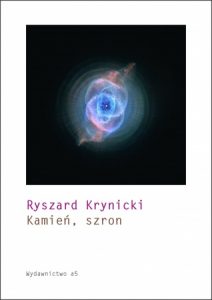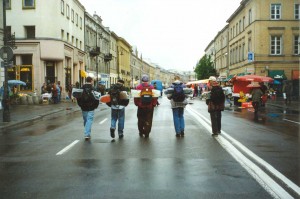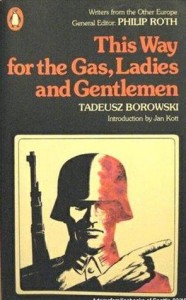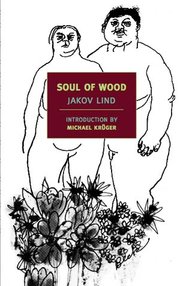When I read that New Century Theatre Company was staging Kenneth Albers’ adaptation of Franz Kafka’s The Trial in the former INS building, I knew I had to go. When I read The Trial, one of the things I loved most about it was how well it captured the arbitrariness of living in a totalitarian society. Despite having lived under a dictatorship, I’m pretty ensconced in this Western world of choice, and when I read the description of the play, I wondered how well things like the pre-play “processing” we were to undergo would go over with a Western audience.
The Processing
Before the play, we lined up in the hall of the INS building. Loudspeakers repeated and repeated a loop of information about the play and one of the actors told us repeatedly how long the play was and how impossible it would be to get out once we were seated (so we should go to the bathroom now). Despite having been to the bathroom twice, I felt antsy. Other patrons began whispering rumors of what it was going to be like inside. I wondered what the processing would entail. I worried I wouldn’t be seated next to my husband. I thought they might take away the water bottle of the man in front of us.
Once we were admitted to the anteroom, it did seem like we might be separated and I was pretty sure this was the last play my husband would ever see with me. The doors to the theater swung open and three impossibly tall girls with plastic smiles and white lab coats led us inside. Disorientation achieved. The seats were steeply stacked like a series of three jury boxes around a red curtain. They were difficult to enter and I couldn’t see the exit. I was starting to worry about the fire code. Immersed in an inescapable system. The one feeling they didn’t achieve was arbitrariness. My husband and I discussed this at length and wondered if this was to avoid setting the audience against the actors to start. Despite the fact that I do prefer to sit with my husband, we both wished they had pushed it further.
Has the Play Already Begun?
As we sat in uncomfortable chairs waiting for the play to begin, we watched those three girls seat other patrons. One was rigidly polite. Another started out instructive and began getting testy. I liked watching her scold people as they failed to follow her instructions. I also liked how easy it was to make eye contact with patrons in other sections. We were complicit in enjoying the disorientation of those who did not yet understand the system. But we were all victims of the syrupy sweet soundtrack on a short repeat cycle. It was maddeningly effective.
Behind the Red Curtain
A man stands stunned in lamplight. Two men stare at him. He cannot understand that he is being arrested or why. Darragh Kennan is believably confounded as Joseph K. And Alex Matthews and Michael Patten are deliciously obtuse as Willem and Franz. So far, we’re pretty faithful to the book. In fact, the adaptation is relatively faithful throughout with only a few changes of note. Joseph’s three secretaries (Sydney Andrews, Sara Mountjoy-Pope, and Greta Wilson) add a conspiratorial note and a lot of sex appeal to the play. I loved watching them cross their legs and rotate their right feet in unison as they watched Joseph suffer.
Amy Thone as Joseph’s lawyer recalled the best of His Girl Friday’s Rosalind Russell and her incessant motoring around the stage (literally) made it feel like she was wrapping Joseph up in the case for easy delivery. Joseph pings back and forth between the gentle solace offered by Aunt Clara (Marty Mukhalian) and the conspiratorial maliciousness of Frau Brubach (Tonya Andrews) and allows himself to get more deeply entrenched as he is seduced by Leni (Hanna Mootz) and Block (David S. Klein). I especially enjoyed Alexandra Tavares as Titorelli. She delivered doublespeak like Big Brother was really watching. Another favorite was MJ Sieber as the Priest who shows Joseph how he orchestrated his own demise.
Can Kafka be Translated for a Western Theater Audience?
Absolutely. Overall the play was amazing. The use of noir-inspired lighting and the way some action was condensed into dance-like interludes were both brilliant choices by director John Langs. I felt Leni’s part was under-written and the scene with the architect went on a few beats too long. I was glad Albers chose to shift a few of the key roles in the novel to be played by women.
Having lived in Eastern Europe where a smile is a commodity not to be wasted, I was surprised at how smiles (menacing though they were) were used throughout this staging. I wonder if that was to make it more relatable to a Western audience. After I got over my own bias, it worked and that fake-happy was carried through in other ways as well. I expected to feel more connection with the INS building, but in the end, the play was strong enough without it.
The show runs through May 5. It’s sold out, but if you show up for the waiting list, you have a decent chance of getting in. Try it. The play lends a whole new angle to Kafkaesque.
 Although it’s been over a decade since I held a coherent conversation in Polish, I am still drawn to the language. Sometimes I watch dark movies filmed during Communism and sometimes I pick up books in Polish at used bookstores, thinking that I will someday read one. A few months ago, I saw Kamień, szron by Ryszard Krynicki at just such a bookstore and the shortness of the poems made me think this would be the Polish book I would finally read. And I did. Kind of.
Although it’s been over a decade since I held a coherent conversation in Polish, I am still drawn to the language. Sometimes I watch dark movies filmed during Communism and sometimes I pick up books in Polish at used bookstores, thinking that I will someday read one. A few months ago, I saw Kamień, szron by Ryszard Krynicki at just such a bookstore and the shortness of the poems made me think this would be the Polish book I would finally read. And I did. Kind of.
 In terms of historical importance, little more can be said of This Way for the Gas, Ladies and Gentlemen. It, like Night, is a testament to the Nazis’ atrocities at Auschwitz. While contemporary novels wink at us with wit and an ironic tone, Tadeusz Borowski’s work floats above like a wise parent whose wrenching past overwhelms the smallness of our daily distractions and grievances. To say it’s one of the most valuable books of the twentieth century is a meager compliment.
In terms of historical importance, little more can be said of This Way for the Gas, Ladies and Gentlemen. It, like Night, is a testament to the Nazis’ atrocities at Auschwitz. While contemporary novels wink at us with wit and an ironic tone, Tadeusz Borowski’s work floats above like a wise parent whose wrenching past overwhelms the smallness of our daily distractions and grievances. To say it’s one of the most valuable books of the twentieth century is a meager compliment.